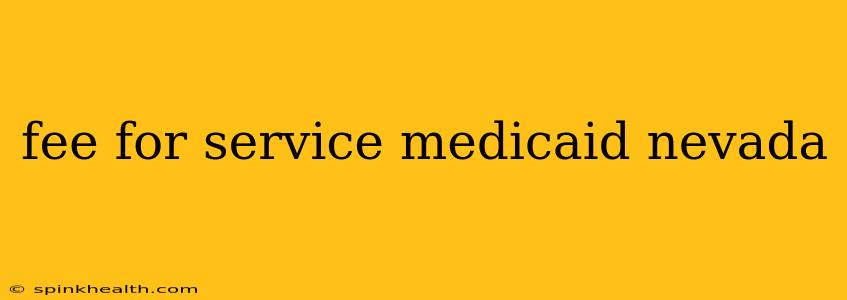Navigating the world of Medicaid can be complex, especially when understanding the intricacies of fee-for-service models. This guide delves into the specifics of Nevada's Medicaid fee-for-service system, addressing common questions and providing valuable information for providers and beneficiaries alike.
Imagine this: Maria, a single mother working a low-wage job, recently lost her employer-sponsored health insurance. Worried about affording healthcare for her children, she applies for Nevada Medicaid, hoping for a lifeline. Her application is approved, and she's enrolled in the fee-for-service program. This means that healthcare providers are paid directly for each service they provide to Maria and her family. Understanding how this system functions is crucial for both Maria and her healthcare providers.
What is Nevada's Medicaid Fee-for-Service Program?
Nevada's Medicaid fee-for-service program, officially known as the Nevada Medicaid program, is a government-funded healthcare program for low-income individuals and families. Unlike managed care, where patients are assigned to specific healthcare providers or networks, fee-for-service allows beneficiaries to choose their own doctors and healthcare facilities. Providers are reimbursed by the state for each medical service rendered, based on a pre-determined fee schedule. This schedule is regularly updated and reflects the average cost of services within the state.
How are Fees Determined for Medicaid Providers in Nevada?
The fees paid to providers under Nevada's Medicaid fee-for-service program are determined through a complex process involving several factors. The state considers the prevailing market rates for similar services, aiming to ensure that providers are fairly compensated while maintaining fiscal responsibility for the program. These rates are often negotiated, and the process is subject to continuous evaluation and adjustment.
What are the specific reimbursement rates for different medical services?
Specific reimbursement rates vary greatly depending on the type of service provided. There is no single, easily accessible public database detailing every rate for every procedure or visit. These rates are typically available to providers through the Nevada Medicaid provider portal and are subject to change. To obtain precise information, providers must either access the state's official provider resources or contact the Nevada Division of Health Care Financing and Policy directly.
Does Nevada Medicaid have different fee schedules for different types of providers?
Yes, Nevada Medicaid uses different fee schedules for different types of providers, reflecting the varying costs and complexities associated with each specialty and service. For example, the reimbursement rate for a family physician's office visit will differ from the rate for a specialist, such as a cardiologist, performing a procedure.
What are the payment methods used by Nevada Medicaid?
Nevada Medicaid typically utilizes electronic funds transfer (EFT) as the primary method for disbursing payments to providers. This streamlines the payment process and ensures prompt reimbursement for services rendered.
How Does a Provider Participate in the Nevada Medicaid Fee-for-Service Program?
To participate, providers must meet specific requirements set by the Nevada Division of Health Care Financing and Policy. These requirements usually involve completing an application process, signing a provider agreement, and adhering to the program's rules and regulations. The application process involves demonstrating compliance with relevant licensing and accreditation standards, as well as agreeing to the fee schedules and billing requirements.
What are the challenges faced by providers participating in the Nevada Medicaid Fee-for-Service Program?
While the fee-for-service model provides flexibility, some providers express concerns about reimbursement rates, which they believe may not always cover their overhead costs fully. Additionally, the administrative burden associated with Medicaid billing and compliance can be significant for smaller practices. Many providers find that the reimbursement rates are lower than those paid by private insurance, leading some to limit their acceptance of Medicaid patients.
This detailed guide sheds light on the Nevada Medicaid fee-for-service program, offering a better understanding of its mechanisms, challenges, and the overall landscape of healthcare access for low-income individuals within the state. While it cannot replace official information from Nevada's Division of Health Care Financing and Policy, it aims to provide a starting point for both beneficiaries and healthcare providers seeking clarification on this crucial program. Remember, always refer to official state resources for the most current and precise information.

